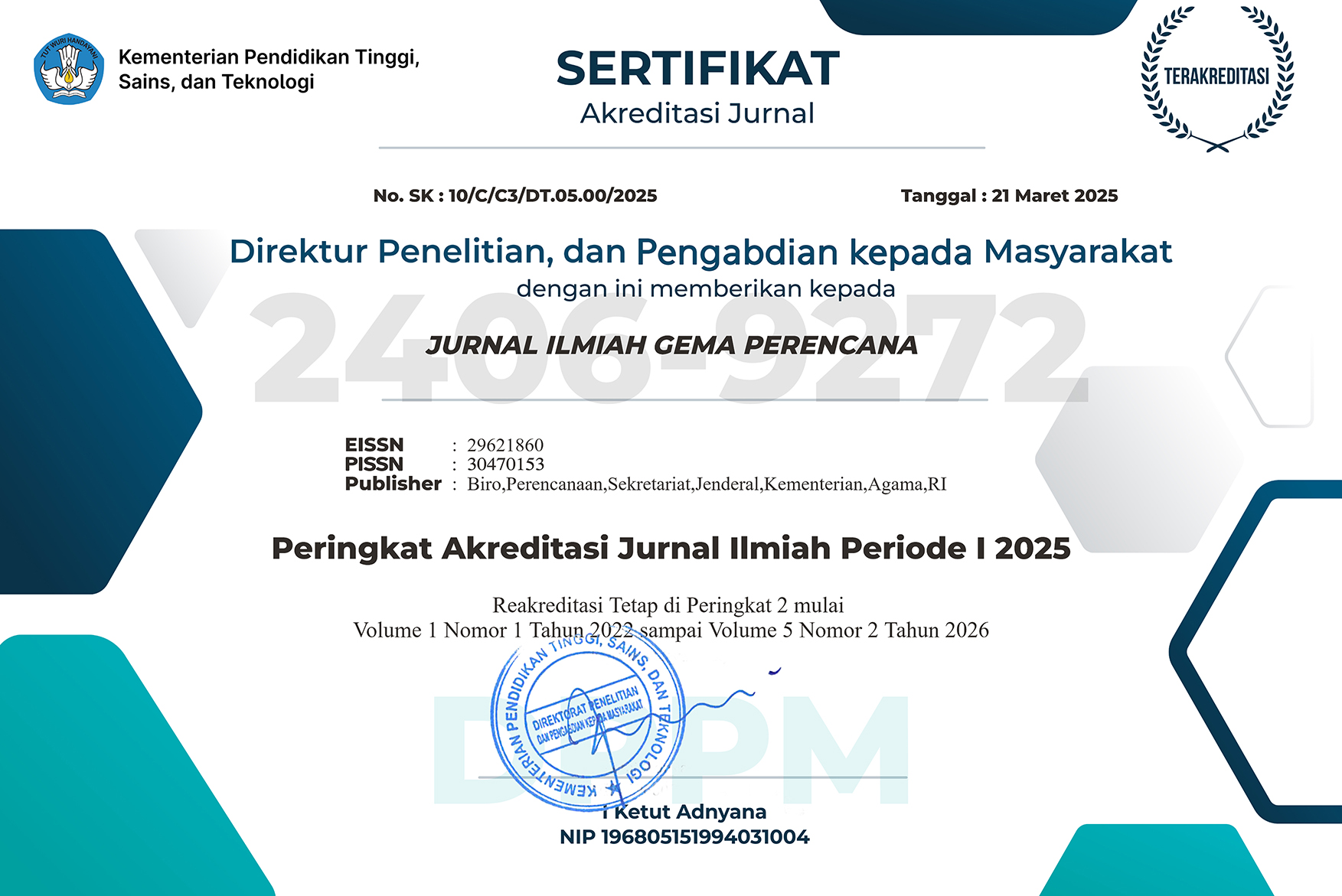Strategic Role of Ministry of Religious Affairs’ Civil Servants in Promoting Productive Cash Waqf in Central Kalimantan
DOI:
https://doi.org/10.61860/jigp.v4i1.222Abstract
This policy paper describes that cash waqf is one of the strategic Islamic philanthropic instruments in supporting social and economic development. However, its implementation among civil servants (ASN) in the Ministry of Religious Affairs of Central Kalimantan Province still faces various obstacles. The ideal condition expecting active participation from ASN in the cash waqf movement has not been realized due to low waqf literacy, lack of integration with digital systems, and the absence of technical policies at the regional level. This study aims to analyze policy strategies that can promote the structured and sustainable implementation of cash waqf among ASN. A qualitative approach with a case study design was used. Data were collected through document studies, focused interviews, and literature review. The analysis applied the theoretical frameworks of Public Participation (Cohen & Uphoff), Change Agent (Rogers), and Substantive Rationality (Weber) to explore the roles of actors, the change process, and the socio-religious motivations of ASN. The findings indicate that the absence of integrated waqf literacy in ASN development, the lack of internal change figures, and weak institutionalization are the main challenges. The conclusion of this study emphasizes the need for affirmative policy at the regional level. The main recommendation is the issuance of a Circular Letter by the Head of the Regional Office of the Ministry of Religious Affairs of Central Kalimantan that mandates the integration of cash waqf literacy into the ASN development system, in order to foster productive, structured, and sustainable participation.
Downloads
References
Al-Qur’anul Karim.
Ainurrahma, S. (2024). Analisis Literasi Wakaf Uang di Kalangan ASN Ditjen Bimas Islam Kemenag RI. Al-Tijarah: Jurnal Ekonomi Syariah, 7(2), 105–118.
Ali, M. D. (2004). Sistem ekonomi Islam. Jakarta: UI Press.
Astina Mandiri. (2024). Efektivitas Wakaf Produktif dalam Mendukung Pembangunan Sosial-Ekonomi Berkelanjutan. Laporan Penelitian Internal.
Azizah, N. (2024). Literasi Wakaf Uang ASN Kementerian Agama Kota Padang. Jurnal Ekonomi Islam, 5(1), 45–60.
Badan Pusat Statistik Provinsi Kalimantan Tengah. (2023). Provinsi Kalimantan Tengah dalam angka 2023. https://kalteng.bps.go.id/id/publication/2023/02/28/45c828b0139ad2a9d3b848ca/provinsi-kalimantan-tengah-dalam-angka-2023.html
Badan Wakaf Indonesia. (2020). Survei Indeks Literasi Wakaf Nasional. Jakarta: BWI.
Badan Wakaf Indonesia. (2023). Indeks Wakaf Nasional 2023: Laporan Rakornas BWI. https://www.bwi.go.id/wp-content/uploads/2023/12/IWN-2023_Rakornas.pdf
Badan Wakaf Indonesia. (2023). Laporan kinerja wakaf nasional tahun 2023. Jakarta: BWI.
Badan Wakaf Indonesia. (2023). Roadmap perwakafan nasional 2020–2025. Jakarta: BWI.
Badan Wakaf Indonesia. (2023). Riset Indeks Wakaf Nasional. https://www.bwi.go.id/wp-content/uploads/2023/12/IWN-2023_Rakornas.pdf
Badan Wakaf Indonesia. (2025). Menjadi lembaga nazhir profesional: Panduan dan standar kompetensi kelembagaan wakaf. https://www.bwi.go.id/storage/2025/03/Menjadi-Lembaga-Nazhir-Profesional-2025.pdf
Bank Syariah Indonesia. (2024). Peran LKS-PWU dalam gerakan wakaf uang nasional.
Bukhari, I. (2002). Shahih Bukhari (Hadis No. 2737).
Cizakca, M. (2000). A history of philanthropic foundations: The Islamic world from the seventh century to the present. Istanbul: Osmanli Arastirmalari Vakfi.
Cohen, J. M., & Uphoff, N. T. (1980). Participation’s place in rural development: Seeking clarity through specificity. World Development, 8(3), 213–235.
Fatwa Majelis Ulama Indonesia. (2002). Fatwa MUI tentang wakaf uang. Komisi Fatwa MUI. https://mui.or.id/baca/fatwa/wakaf-uang
Hasan, M. (2019). Filantropi Islam dan wakaf uang: Perspektif hukum dan ekonomi syariah. Jakarta: Kencana.
Hasanuddin. (2018). Model pengembangan wakaf uang produktif di Indonesia. Jakarta: BWI Press.
Ibrahim, A., Amelia, E., Nur Kholis, N. A., Utami, S. A., & Nofrianto. (2021). Pengantar ekonomi Islam. Yogyakarta: Deepublish.
Imam, T. S. (2023). Perkembangan perwakafan nasional. BWI Jurnal Perwakafan, 1(1). https://www.bwi.go.id/wp-content/uploads/2023/12/A
IPMAFA Library. (2021). Indeks wakaf nasional: Kajian per provinsi. Pusat Studi Wakaf IPMAFA.
Kementerian Agama Republik Indonesia. (2024). Surat Edaran Menteri Agama Republik Indonesia Nomor SE.05 Tahun 2024 tentang Gerakan Wakaf Uang bagi ASN, Peserta Didik, dan Masyarakat.
Kementerian Agama Republik Indonesia. (2025). Keputusan Menteri Agama Republik Indonesia Nomor 244 Tahun 2025 tentang Program Prioritas Kementerian Agama Tahun 2025–2029.
MDPI. (2023). Waqf Investment Funds in Saudi Arabia: Integrating Islamic Principles with Contemporary Social Goals. MDPI Open Access Journals. https://www.mdpi.com
Mata Kalteng. (2024). ASN dan wakaf uang: Peran yang masih terbatas. https://biroadpim.kalteng.go.id
Muslim, I. (2006). Shahih Muslim (Hadis No. 1631).
Pemerintah Republik Indonesia. (2006). Peraturan Pemerintah Republik Indonesia Nomor 42 Tahun 2006 tentang Pelaksanaan Undang-Undang Nomor 41 Tahun 2004 tentang Wakaf. https://peraturan.bpk.go.id/Details/49182/pp-no-42-tahun-2006
Pemerintah Provinsi Kalimantan Tengah. (2024). Plt. Sekda: Wakaf uang masih baru bagi masyarakat, perlu peningkatan literasi. https://setda.kalteng.go.id
Rogers, E. M. (1995). Diffusion of innovations (4th ed.). New York: The Free Press.
RRI Palangkaraya. (2024). Program wakaf uang dan sosialisasinya di Kalimantan Tengah.
Scribd. (2024). Pokok-pokok Surat Edaran Menteri Agama tentang Wakaf Uang ASN. https://www.scribd.com
STAI Tangho. (2024). Yayasan Mutiara Tarbiyah dan peranannya dalam wakaf daerah.
Sumarno, D. H. (n.d.). Mengapa harus profesional?
Syi’ar Iqtishadi. (2021). Pengelolaan Wakaf Uang dan Tantangan Literasi. Jurnal Pengembangan Ekonomi Islam, 6(3), 211–226.
Tim Pemberdayaan Zakat dan Wakaf Bidang Bimas Islam, Kanwil Kementerian Agama Provinsi Kalimantan Tengah. (2024). Dokumen internal dan wawancara lapangan.
Turkish Journal of Islamic Economics. (2021). Cash Waqf as a Social Finance Instrument to Support the SDGs. Turkish Journal of Islamic Economics (TUJISE), 8(2), 123–140. https://tujise.org
Unit Pengumpul Zakat (UPZ) Kanwil Kemenag Kalimantan Tengah. (2024). Laporan dan catatan teknis program zakat dan wakaf tahun 2023–2024.
Universitas Siliwangi. (2025). Wakaf Produktif: Menggerakkan Perekonomian Rakyat Menuju Kemandirian Ekonomi Umat. Jurnal Sawala Ekonomi Islam, 12(1), 45–60.
Widiastuti, A. (2025). Capaian Indikator Makro Pembangunan. 2025. BPS Provinsi Kalimantan Tengah.
Downloads
Published
How to Cite
Issue
Section
License
Copyright (c) 2025 Noorhasanah

This work is licensed under a Creative Commons Attribution 4.0 International License.






